Click HERE to donate to LHA
See Projects in India for a summary of projects and ongoing programs which are still in need of funding.
Completed Projects
PURCHASE: AHIMSA HOUSE BUILDING PURCHASE
In 2007, the Ahimsa House, a newly-built 4-story building near the home and temple of His Holiness the Dalai Lama in Dharamsala, perfect for LHA/Lha Charitable Trust, became available for $175K. Following LHA's first-ever direct request for donations from supporters and previous volunteers, 80% of the funds for the building were soon donated. The Tibetan staff of Lha Charitable Trust reached out to previous volunteers and raised the remaining funds. The lower floors of the building now house a coffee shop/cafe and dining hall that helps to fund the organization. The top two floors accommodate office space, class rooms and three apartments that accommodate long-term volunteers and the director of Lha Charitable Trust.
CONSTRUCTION: SELF SUFFICIENCY FOR NUNS BUILDING
An overly-crowded Tibetan nunnery in Dharamsala was unable to meet the needs of nearly 300 nuns living there. They lacked access to clean water, healthy food, and medical care. Tulane student and LHA volunteer Erica Trainee took on this project and raised $90,000 to address these needs. She funded construction of a two story building next to the existing nunnery. Many of the nuns moved into the new living spaces on the top floor while the rooms on street level were rented as store fronts which generate income focused on the nuns' other needs. LHA has since installed a water filtration system there to supply clean drinking water. It was donated by Lama Lena, who often teaches Tibetan Buddhism at the New Orleans LHA Community Center .
PUBLIC HEALTH INITIATIVE FOR MONKS
In a monastery near Dharamsala which houses more than 300 monks, health problems (including TB, hepatitis, and gastro intestinal problems) were widespread, including TB, hepatitis, and serious stomach problems. Three public health volunteers whom LHA sent to assess the situation discovered that the monks had no hot water for cleaning/washing, contaminated drinking water, dilapidated bathrooms, and a short supply of razors (which they shared to shave their heads each month). In addition, the sleeping quarters were terribly overcrowded. First, LHA supplied an abundance of disposable razors to help eradicate the hepatitis problem. Next, a solar water heating system, followed by a water filtration system, significantly reduced cold and flu outbreaks, stomach problems and other water-borne diseases. In addition, LHA’s programs for Eye, Dental and Medical care have focused here for a number of years. The monastery is now a beacon of health which has set the example for many other monasteries and nunneries to follow.
CONSTRUCTION AND OPERATION
OF DHARAMSALA'S FIRST SOUP KITCHEN
Dharamsala’s first soup kitchen for Tibetans was completed in LHA’s Ahimsa House building for about $30K. Anoop Jain, LHA volunteer and Tulane student, gave public talks and used social media to raise the funds. The family of Benedicte Kirkoen, LHA volunteer from Norway, donated $4K needed to have furniture locally made. As construction neared completion, the Ahimsa House soup kitchen story reached an elementary school girl in California, Anjali, whose parents donated the $22K needed for kitchen equipment. We named the kitchen “Anjali’s Kitchen” after that little girl. It opened in July of 2012, on the birthday of His Holiness the Dalai Lama, and until 2022 it served free healthy meals to needy Tibetan refugees. In 2019, when the pandemic hit, the soup kitchen was transformed into a 'Meals On Wheels' program delivering meals and medication to the homes of those in need. Lha Charitable Trust partnered with Delek Hospital during this difficult time. Following the pandemic, the soup kitchen was transformed into a cafe/coffee-shop/job skills training center which now raises funds to support projects which address current needs in the community. The soup kitchen is an excellent example of how LHA evolves organically to meet the community's needs as they arise.
TIBETAN COFFEE SHOP, PATISSERRIE
AND JOB SKILLS TRAINING CENTER
The coffee shop at the LHA Ahimsa House building is now open and generating sustainable income for the organization. It also serves as a small business learning platform and teaching tool. The space offers a fair-trade outlet selling Tibetan arts and crafts. It's a local yet international gathering spot to further promote awareness of LHA's projects and the Tibetan situation. It is part of the LHA Ahimsa house complex, only steps away from the Dalai Lama’s main temple, offering a good flow of customers. Big thanks to the Tulane School of Social Work 2018 India Group for their coffee shop project ideas and fundraising activities, headed up by Mark Drake. Also, special thanks to Tripti Singh for sharing her business expertise and for securing more than 50% of the donations needed to complete this project.
MISCELLANEOUS
Some smaller projects that LHA has sponsored include:
 —Construction of a kitchen and donation of new computers —Construction of a kitchen and donation of new computers
   for the office for the Tibetan Women’s Association (TWA) for the office for the Tibetan Women’s Association (TWA)
 —Furnishings for a nursery school for children of Tibetan —Furnishings for a nursery school for children of Tibetan
   government employees government employees
 —A kitchen and other start-up costs for a Tibetan elementary —A kitchen and other start-up costs for a Tibetan elementary
   school in Tso Pema school in Tso Pema
 —A kitchen for the Ngakpa Gompa and Community Center in —A kitchen for the Ngakpa Gompa and Community Center in
   Dharamsala Dharamsala
 —In collaboration with the Rotary Club of Dharamsala, a water —In collaboration with the Rotary Club of Dharamsala, a water
   well was established in a rural slum community well was established in a rural slum community
 —Distribution of more than 30,000 books to Tibetan schools —Distribution of more than 30,000 books to Tibetan schools
 —Construction of a basketball court for the Tibetan Day School —Construction of a basketball court for the Tibetan Day School
   in McLeod Ganj (Tulane students Jake, Dan and Trevor put in McLeod Ganj (Tulane students Jake, Dan and Trevor put
   this one together) this one together)
 — Establishment of Dharamsla’s first Leprosy Assistance Program — Establishment of Dharamsla’s first Leprosy Assistance Program
 — Community Center Kitchen built for Rigdzen Namdolling — Community Center Kitchen built for Rigdzen Namdolling
 Ngakpa Gonpa Ngakpa Gonpa
 —2022 construction of a new roof and meeting room atop —2022 construction of a new roof and meeting room atop
 Ahimsa House, dedicated to the memory of Bernard Fleming Ahimsa House, dedicated to the memory of Bernard Fleming
Self-Sufficient and/or Funded Ongoing Programs
Now Offered Through Lha Charitable Trust
SKILLS TRAINING PROGRAM / TRADE SCHOOL
Sponsored by the Tibet Fund, under the guidance of Bob Ankerson, our Tibetan partners now organize a trade school. Classes and internships are offered, free, to young, unemployed adults who need marketable skills. Thus far, 380 Tibetan refugees completed courses and most are now employed. Completion certificates include: Restaurant Chef, Barista, Bakery, Bartending, Beautician, Tibetan Traditional Massage, Electrician and Physical Fitness Trainer. Students also receive classes in basic English language, basic computer skills and financial literacy.
LANGUAGE TRAINING
Most Tibetans arrive in India speaking only Tibetan, making it difficult to find jobs and to assimilate in India. Free classes in English, French, Spanish, German, Chinese and Tibetan are offered year round. Many learn English first, and then move on to French, Spanish, or German, to increase the odds of being accepted for residency by a country which offers opportunities for refugees. In more affluent countries, they can work to earn money to send to their families in Tibet. Some learn Chinese in hopes of returning to Tibet, should human rights conditions improve. Chinese is now the main language spoken in Tibet. Others, who have arrived from Tibet more recently, have not had the opportunity to learn Tibetan in school there (due to Chinese regulations) so they learn their mother language here in India.
COMPUTER TRAINING
Tibetans with even minimal computer skills have better chances of finding employment and relocation opportunities in other countries. Free computer classes have been part of the services offered since our first two computers were donated – author Hunter S. Thompson donated two of his personal laptops to help get our computer school started in 2001. The following year the office of His Holiness the Dalai Lama donated 12 new computers, which abled us to open a second location specifically as a computer school. Computer classes are currently offered to focus on specialized areas when skilled volunteers manifest to teach.
VOLUNTEER COORDINATION
Travelers from countries across the world come to visit Dharamsala, home of the Dalai Lama, and many have the time and inclination to help the Tibetan refugee community. Lha Charitable Trust is the hub for volunteer coordination. Many volunteers teach in the language and computer courses while others are placed throughout the community as skills and needs are matched up. Lha Charitable Trust has now coordinated and placed over 15,000 volunteers from more than 53 different countries.
COMMUNITY LIBRARIES
LHA established a small reading room in 2004, with books donated by travelers. Thanks to volunteer librarians and more donated books, the lending library is now open all year to Tibetans, other Dharamsala residents, and international visitors. We also support a second and larger Library in Tso Pema, the Padmasambva Public Library. We also worked with the OmPrkash Foundation to organize the distribution of 250,000 free books they shipped from the US to India. Previous LHA volunteer Willy Oppenheim founded and runs the OmPrakash foundation, which supports many small non-profits in countries around the world.
DISTRIBUTION OF CLOTHING AND MEDICAL SUPPLIES
One of LHA's first programs arose when volunteers would donate clothing and/or medical supplies they didn’t want to carry home after their time with us. When we began collecting more clothing and medical supplies than we could distribute, we partnered with Tibetan Delek Hospital and the Rotary Club of Dharamsala to help distribute the donations. The Lha Charitable Trust service center has become the main donation drop-off center for the region.
TIBET NATURE WEBSITE
Tibet has become a great source of wealth for China and also a garbage dump. Forests continue to be be clear-cut, massive mining operations go on unregulated, the 4 major rivers that feed Asia are being dammed and severely polluted, and nuclear waste is dumped. China tightly controls information, so it is difficult for Tibetans to find out what's happening in their homeland. Lha Charitable Trust has created the only website, in both Tibetan and English, which is fully focused on Tibet’s environment: www.tibetnature.net.
TIBET FAIR TRADE
Many Tibetans depend on the sale of traditional crafts and artwork. Lha Tibet Fair Trade initiative was developed to help them. Some volunteers work to seek out local artisans in need of marketing assistance while others around the globe find marketing relationships and discover new markets.
TIBETAN COFFEE SHOP, PATISSERRIE
AND JOB SKILLS TRAINING CENTER
The kitchen, dining and outside seating areas of Ahimsa House are now providing a wide array of services and generating sustainable income for the organization. The space serves as a local & international gathering spot to further promote awareness of our projects and the Tibetan situation while at the same time serving as a small business learning platform and a teaching tool. It's all part of the Ahimsa house complex which is only steps away from the Dalai Lama’s main temple offering a good flow of customers. Big thanks to the Tulane School of Social Work 2018 India Group for their coffee shop project ideas, and fundraising activities, headed up by Mark Drake. Also, special thanks to Tripti Singh for sharing her business expertise and for securing more than 50% of the donations needed to complete this project.
See Projects in India for a summary of projects and ongoing programs which are still in need of funding. |
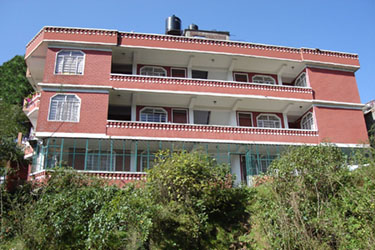
In 2007, LHA acquired The Ahimsa House. building
in Dharamsala, India next to the temple and residence
of His Holiness the Dalai Lama
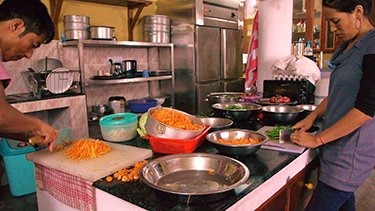
LHA's soup kitchen in the Ahimsa House opened on His Holiness
The Dalai Lama's birthday on July 12, 2012, and served
free nutritious lunches to needy Tibetans for 10 years.

A two-story building to house and provide a sustainable
revenue source for Tibetan nuns was completed in 2014.
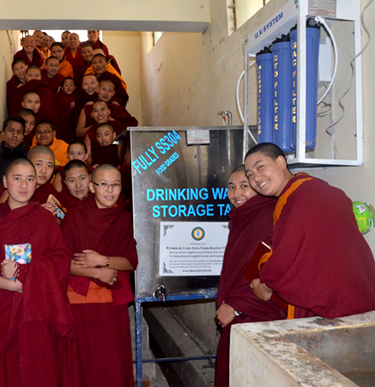
The 'Lama Lena Water Filtration System' provides
hundreds of Tibetan nuns with clean drinking water.
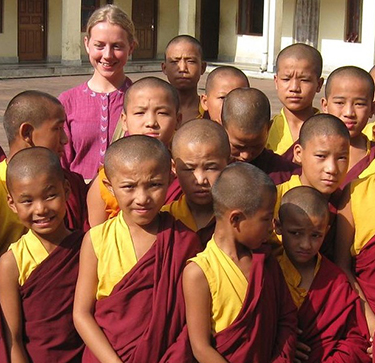
LHA public health volunteers discovered that Hepatitis
was being spread among young monks by the sharing of
razors, which were used for monthly head shaving.
A simple hygiene education program and the distribution
of free, disposable razors solved the problem.
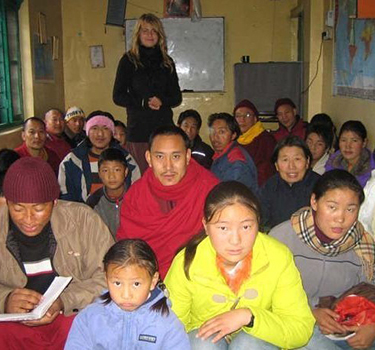
Language skills
are essential to Tibetans adjusting
to life in India. Volunteers teach students of all ages.
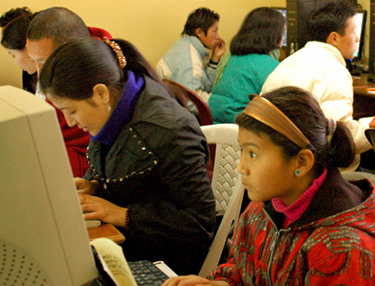
Computer skills help Tibetans to find employment. LHA's
computer classroom offers instruction and screentime.

380 Tibetan refugees have now graduated from the Skills
Training Trade School Program sponsored by Tibet Fund

LHA partnered with the OmPrakash Foundation to
distribute more than 30,000 children's books to Tibetan
and local Indian schools.
The LHA community library
is open to local residents and travelers as both a
quiet reading room and lending facility.

Many Tibetans can earn money by selling carpets and
other textiles and crafts they create. The Tibet Fair Trade
Initiative assists
Tibetan artists and craftspeople.

Volunteers with different skills often enable LHA to offer
different
projects. Here, artist Louise Guidry, taught painting.
|

